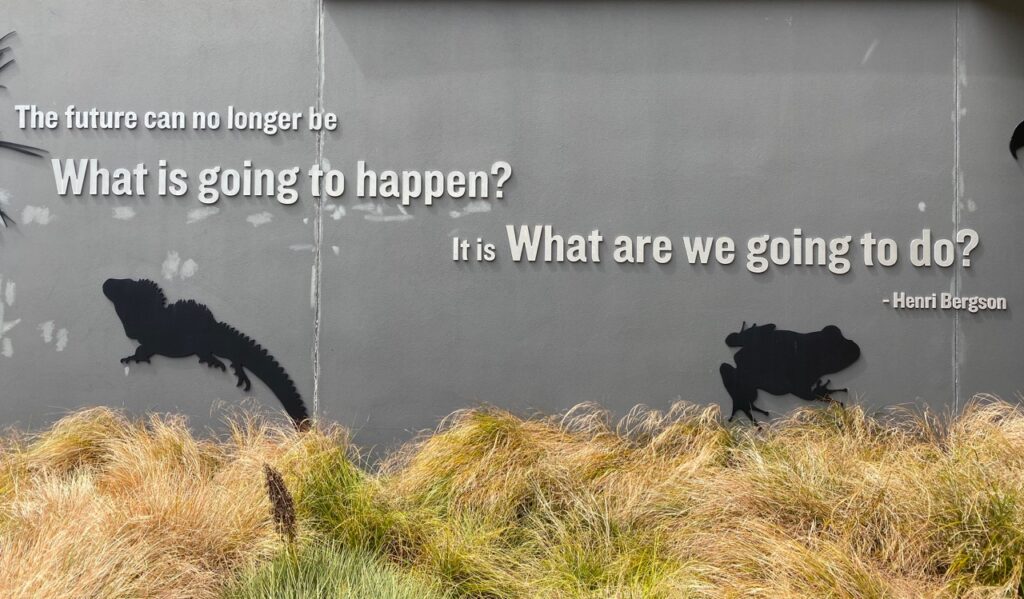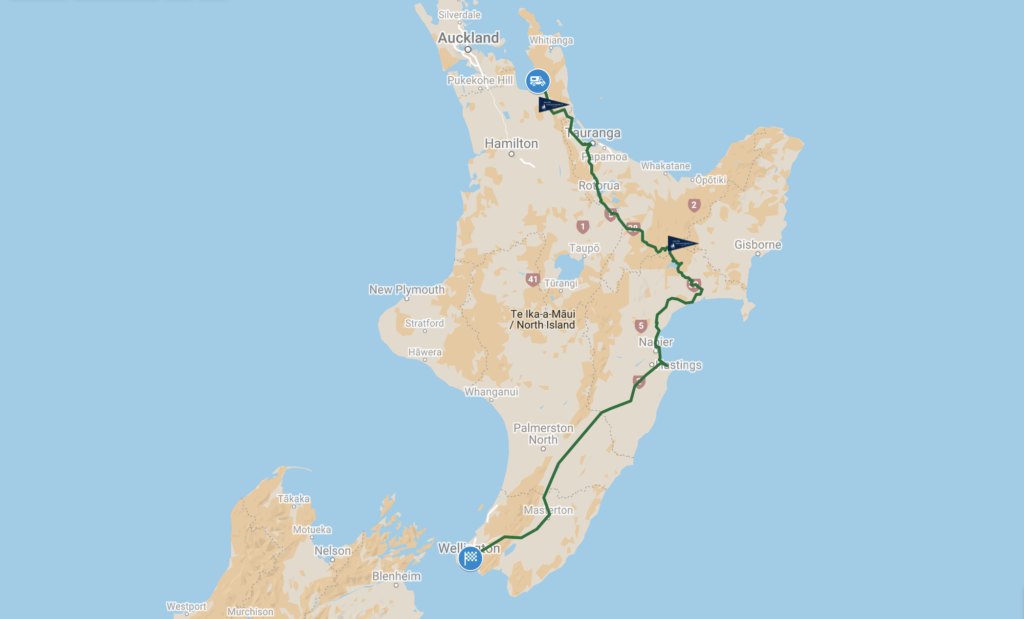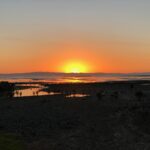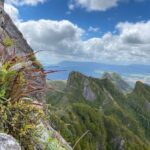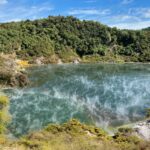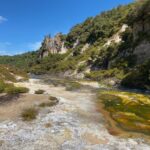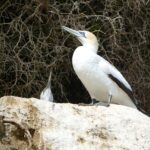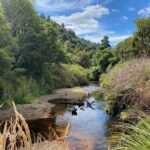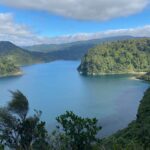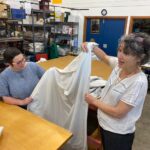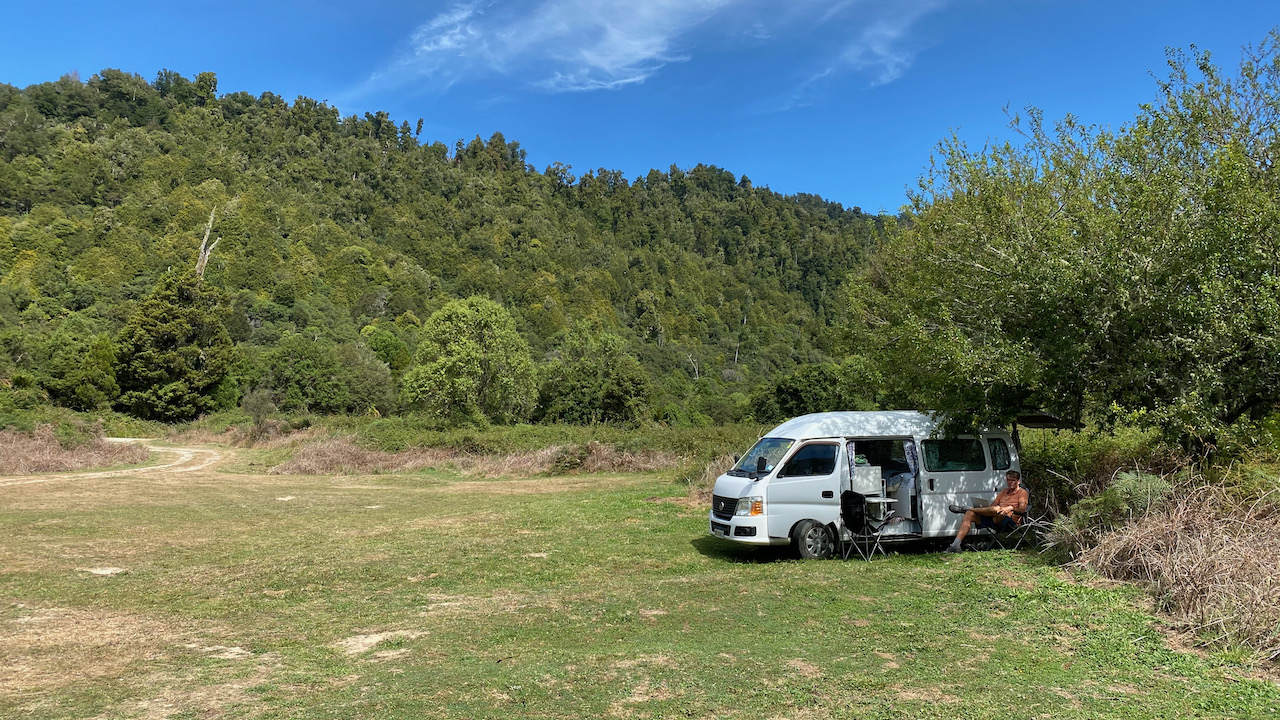
Our road trip in New Zealand goes into full gear on the North Island: natural beauty and sustainable initiatives wrapped in Kiwi hospitality.
Auckland – Wellington (NZL)
As our boat is in maintenance mode and in no state to sail, we are instead using a small campervan to explore sustainable solutions all across the country. New Zealand is supposed to be one of the best countries for it, with stunning nature, camping grounds, and spotless public toilets around every corner. What’s more, it is often possible to “freedom camp”, which involves parking your van in a scenic spot and camping there for the night, for free. The rules have been tightened over the years, so more often than not it is only allowed in designated areas. Still, it should enable us to stay in amazing places while keeping costs low. Which inspiring sustainable initiatives will we find? And how will “vanlife” compare to sailing, we wonder?
Kiwi Hospitality at Its Best
After saying goodbye to our friends in Auckland, our road trip really takes off. We give freedom camping a first try in the town of Thames. It is the gateway to the Coromandel, a large peninsula of rugged mountains and stunning coast line. Not far from the centre of town, we find a small park. A few adjacent parking spaces are designated as freedom camp sites. What’s more, there are picnic tables and clean public toilets nearby. Ivar whips out the pan and portable stove and half an hour later we enjoy dinner while admiring the sunset over the Firth of Thames. We can get used to this!
The next day we hike through the neighbouring national park. We follow the well-marked track through dense forest of countless ferns and other native trees. There are not many other visitors but we are never alone: birds a constantly around us. One type, the piwakawaka (aka fantail) is never far. It approaches us, then makes acrobatic aerial moves using its conspicuous, oversized tail. The tui is much harder to spot but betrays it presence with its distinctive song.
As we gain altitude, the forest makes way for shrubs. We feel the sun burning on our heads now. The climb to the top of the Pinnacles is steep. At the summit we collect our reward: stunning views to both sides of the peninsula. Drenched in sweat, it dawns on us that freedom camping does have one big disadvantage: no shower! As luck would have it, we meet a fellow hiker who lives in Thames and offers a shower at his home. Grateful, we accept and a few hours later we sit in his living room, clean and happy. Dave and his wife emigrated here from South Africa and give us tips which places to visit in the area. Before we leave, they even give us fresh fruit and vegetables from their garden. Such great hospitality!
Smart with Seaweed
The rest of the Coromandel will have to wait, as we have an appointment further south, in Paeroa. On the way there, we get a glimpse of New Zealand’s agricultural side. We pass pastures with sheep and cattle, orchards full of kiwi fruit, apples, and avocados, which are all mainly grown as monocultures. As in many other countries around the globe, agriculture in New Zealand has scaled up and intensified considerably in recent decades. It has led to an immense increase in the use of synthetic fertilizers and poisons, which is causing ecological problems like soil degradation and water pollution. Could a family-owned business that makes bio-stimulants from seaweed be part of the solution?
At Agrisea, directors Clare and Tane Bradley welcome us and tell us their story. “The basis of a healthy crop is healthy soil,” Clare explains. “Healthy soil is a collaborative, living ecosystem with billions of invisible microbes. With the right balance of nutrients, those microbes create symbiotic relationships between plant roots, soil nutrients, soil structure, and water. If they cannot create these relationships, plants cannot absorb the nutrients in the soil sufficiently.” And that is the crux of the matter, Clare explains. “Without access to nutrients, plants are susceptible to pests and less resistant to drought. In response, farmers typically use more synthetic fertilizer and pesticide, which does not improve the soil. Our approach is different, as we focus on healthy soil biology.”
“So what does seaweed do?” we ask Clare. “The bio-stimulants that AgriSea makes from seaweed are a food source for the micro-organisms in the soil. By feeding them, they can do their job and improve the soil. As a result, farmers who use our products can drastically reduce their fertilizer and pesticide use, grow more and healthier plants, and improve their environmental performance.” There are also benefits for animal health and coastal communities, we learn. We are intrigued and describe in more detail the production process, sourcing, and dilemmas involved in a separate sustainable solution item.
Tiny House Builders
Our trip continues to the Bay of Plenty on the North Island’s east coast. The towns get smaller but the properties seem to get larger. It is a lot less densely populated here than the area around Auckland and better reflects the average New Zealand density. Despite all that space, we read that many people all over New Zealand choose to live in tiny houses. While some people build their own, others look for a ready-made one. We go to Katikati where, not far from our freedom campground, we visit a business that caters to that demand: Tiny House Builders.
“Each month we deliver a completely new tiny house, fully furnished according to the customer’s wishes”, Rebecca Bartlett tells us. She is the founder of the family-owned business. Her father Peter shows us some of their model tiny homes. As we step inside, we are taken aback. There is much more space than we expected, and they feel quite luxurious. Everything you need is there: kitchen, living room, bathroom, and bedroom. “You did an astounding job fitting it all in, yet making it feel spacious,” we compliment Peter. He explains that their standard size is 8 metres long, 3 metres wide and 4.2 metres high. “Within these dimensions, several layouts are possible. An important choice for future residents is, for example, the number of bedrooms required.”
Of course, we are curious about the price tag. “The standard version is NZ$ 160,000, about €95,000,” Peter says, adding: “Our order book is full for the next twelve months.” While that it is a sizeable amount of money, it does enable those who don’t have the time, knowledge or ambition to put together a tiny house themselves, to choose a different lifestyle. A lifestyle with simpler but possibly fuller living at its core, with reduced living costs and a smaller environmental footprint. That just screams for a separate item on tiny houses as a sustainable solution, doesn’t it?
Maori Marae and Natural Heat
Our road trip continues south across the North Island to our next stop Rotorua. The city has a vibrant culture of the Maori, New Zealand’s indigenous people, which we are lucky to witness. We are just in time to celebrate the last bit of Waitangi Day, a national holiday in New Zealand. On 6 February, the signing of the nation’s founding document between Maori tribes and British colonists on that day in 1840 is commemorated. The local festivities take place in the neighbourhood of Ohinemutu, where the streets and main square are lined with food stands and live music is performed on a large stage. What’s more, the marae is open to the public. It is the local tribe’s meeting house and place where they connect with their ancestors. On the outside and inside, it is beautifully decorated with wood carvings depicting Maori gods and representations of their culture. Our first taste of Maori culture augments our desire to learn and experience more!
The Rotorua area is also known for its geothermal activity. Before we see any signs of it, we smell it. Sulphur hangs in the air all over the town, betraying the presence of gases from below the surface. On a stroll around town, we also see steam coming out of streams and ponds as proof that geothermal heat is not far away. Yet the scale and power of it only really become apparent when we visit Waimangu Volcanic Valley, a few kilometres out of town. The landscape here changed dramatically after a volcanic eruption in 1886, and traces of the heat just below ground are still clearly visible. Geysers, steam fountains, and lakes of boiling hot water charactarize the scenery. “What a vast natural energy source!” Floris marvels. “Certainly! In fact, I read that New Zealand uses it to generate 17% of its electricity”, Ivar explains. “Looks like another topic for a sustainable solution”, he adds. Stay tuned!
Art Deco and Unexpected Wildlife
The active geology of this part of New Zealand is also indirectly visible in Napier, the next stop on our road trip. The remarkable amount of art-deco style buildings is a result of a massive reconstruction effort following a destructive earthquake in the 1930s. The architectural style of that time was applied to almost all buildings. Many of them are pastel-coloured, giving the town an open-air museum feel.
Napier doesn’t only impress us with its architecture. Its sits at a massive bay, so we decide to do a beach hike. On the way we find washed-up seaweed, the kind AgriSea turns into bio-stimulants. At the far end of the bay we find a colony of gannets. We are used to seeing these magnificent birds out at sea, where they often impress us with their acrobatic fishing techniques. This is the first time we encounter them nesting on land. We observe the adult birds circling above our head before landing close to a nest to feed their young. The birds seem undisturbed by us and allow us to get as many photographs as we like.
Rights for Nature
We drive on to explore Te Urewera, a former national park that is dominated by native forest, or bush as the Kiwis say. Inside the park, our progress is slow, as the road is winding and unsealed. We decide to camp in the middle of the forest. Surrounded by bush, we wake to bird song and use the stream that runs through the campground to freshen up. Freedom camping doesn’t get much better than this!
The land here is the home of the Tūhoe, the local Maori tribe (iwi in their language). In 2014, New Zealand granted legal personality to this area. It was the first time anywhere in the world that a natural phenomenon was recognized as having rights, with the Tūhoe as guardians. At the visitor centre on Lake Waikaremoana, Holly Taylor, a Tūhoe woman, explains why the recognition of Te Urewera as Tūhoe land was significant for her iwi. “In Maori tradition, people cannot own the land, the people belong to the land. It is there when we are born, it is there when we live, and it will be there after we die. It is our duty to be good guardians of the land on which our lives depend, and to pass it on to future generations in the same state as we found it.” The concept strikes us as being a radically different from Western or colonists’ views of nature, in which appropriation and exploitation are the dominant concepts.
Since 2014 two other natural phenomena in New Zealand have been recognised as having legal personality, too: a river and a mountain. Floris reflects: “I guess granting legal personality to natural phenomena is a way to embed a Maori concept in law, which is governed by such (Western) concepts of rights, duties, and property.” In practical terms, it means that the land, river, or mountain is represented by trustees. They look after its long-term interests and is a crucial body in all decision-making processes involving the natural body.
On a hike through the area, we marvel at the purity and wildness of this pristine place. The Tūhoe have been looking well after the park and its legal recognition has given them more tools to do so. It can thus help to protect nature. We intend to do more research on this, so stay tuned for a separate item on rights for nature as a sustainable solution.
Wonderful Wellington
When we reach the country’s capital Wellington at the southern tip of the North Island, for once we don’t have to look for a freedom camp site. Our friends Kerry and Daan have offered the use of their apartment. Such luxury! We enjoy the views over the bay, the warm showers, and the washing machine. Its central location allows us to explore the city by foot. We start at the national museum Te Papa, where New Zealand’s history, nature, and culture is on display. In fact, is so overwhelmingly interesting that we plan to come back another time to see more exhibitions.
Not far from the city centre we visit eco-sanctuary Zealandia to see and learn more about New Zealand’s unique ecosystems. New Zealand became an island about 80 million years ago, 15 million years before the dinosaurs became extinct. And while mammals developed in the rest of the world, in New Zealand birds and large insects became the dominating fauna in the ecosystem. Mammals such as rats, possums, cats and hedgehogs were introduced by humans much later, with disastrous consequences for the native ecosystems. In Zealandia they keep these so-called pests out with a high fence to allow native birds, reptiles and insects to thrive. Their long-term goal is to restore the area to it’s original state, meaning the way it was before the arrival of humans. We’re thrilled to also see the flightless kiwi here, the national symbol of New Zealand, and the pre-historic reptile tuatara. Both have become rare in so many areas around the country.
Wellington is also the seat of government, and unsurprisingly the Netherlands has an embassy here. We get to visit Dutch ambassador Mira Woldberg and her staff, who seem to take sustainability quite seriously. Not only does the ambassador come to the office by bicycle, the embassy is also well aware of various sustainable initiatives in New Zealand. They help us tremendously by sharing our story in their network and connect us to interesting sustainability initiatives. That including the organization in Wellington that made the embassy building more sustainable: Sustainability Trust.
In Sustainability We Trust
“I just love what you guys are doing, shall we meet over the weekend? My husband Marc and I would really like to get to know you.” Isabelle from Sustainability Trust writes to us. We meet for coffee but have so much to talk about that we follow it up with lunch. Originally from France, they became kiwis years ago. Isabelle runs the shop at Sustainability Trust, while Marc is a sailor and boat builder experimenting with sustainable building materials. Isabelle also explains the various activities of Sustainability Trust, an organization that is committed to making daily life more sustainable in as many ways as possible.
When we visit the organisation after the weekend, director Georgie Ferrari gives us an extensive tour. We first stop at the warehouse, which is stacked with insulation material and heat pumps. “Insulating houses and installing heat pumps is one of the best ways to make houses more sustainable”, Georgie explains. “The insulation saves a lot of energy, and the heat pumps make fossil fuels for heating obsolete. These activities earn us money, which makes our other activities possible.” Georgie clarifies. Those other activities include repurposing donated curtains to people who cannot afford them, collecting all kinds of materials for recycling, and encouraging cycling in the city. We are also impressed by Isabelle’s store, which has a wide range of sustainable products. The love proves mutual. “When you are back in Wellington on your return trip, will you come by and give a presentation about your journey?” Georgie asks when she says goodbye. To which Isabelle adds: “You can stay with us!” We say yes to both right away!
Time for Action
On our last evening in Wellington we sit on the balcony of Kerry and Daan’s apartment and reflect on our road trip until here. “I do miss Luci sometimes. Nothing beats traveling with your own house and using the wind to travel. But the campervan does allow us to move at a much faster pace”, Ivar notes. Floris agrees: “It’s unbelievable how many wonderful encounters and sustainable discoveries we have had in such a short time.” It shows once again how many people are committed to bringing about sustainable change, be in terms of how we grow food, treat nature, live, or produce electricity. Their actions make us think of Zealandia. At the entrance is a quote by French philosopher Henri Bergson: “The future can no longer be What is going to happen? It is What are we going to do?” We wholeheartedly agree. Despite the many crises humanity and our planet are facing, there is so much we can do about it. Phasing out synthetic fertilizers and pesticides in agriculture, deliberately reducing your housing footprint, transitioning to the use of renewable energy, granting legal rights to nature to enhance its protection, saving energy by insulating homes, re-using and recycling, being hospitable to strangers and conserving indigenous ecosystems are all tangible and inspiring examples of positive action that we encountered on New Zealand’s North Island.
What else we are going to do? Tomorrow we will take the ferry across the Cook Strait to the South Island for part 2 of our road trip in search of sustainable solutions in New Zealand. We can’t wait to see what else we will find!
